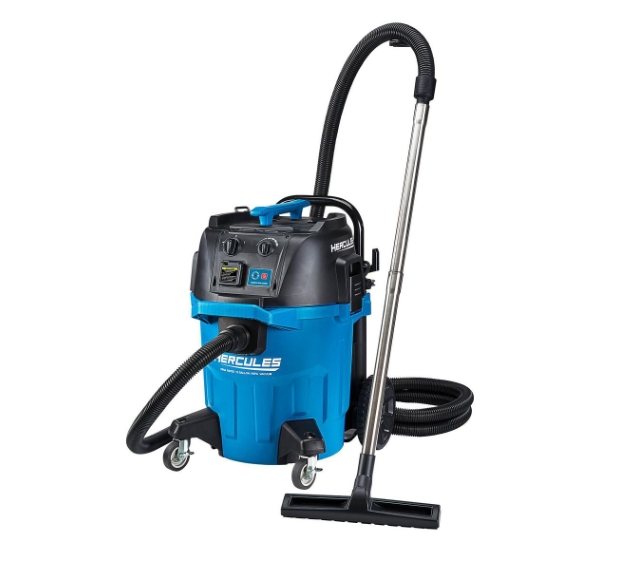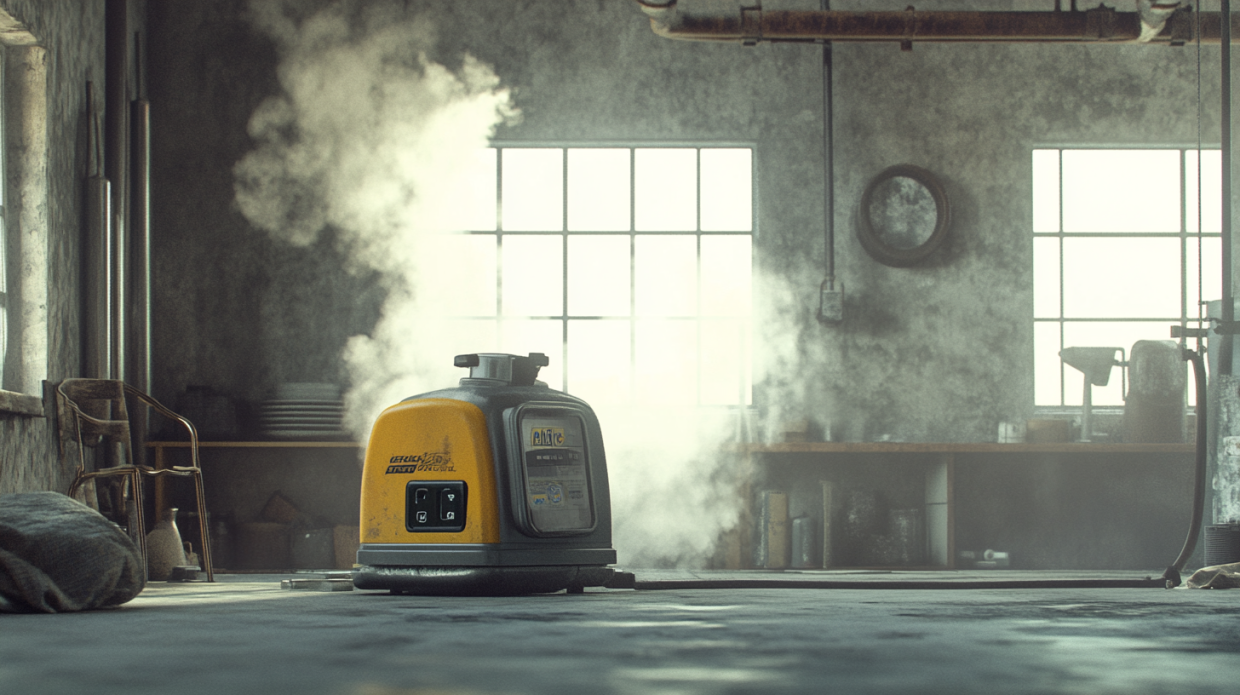
HERCULES 12 Gallon OSHA-Compliant Dust Extractor
- 6.5 peak HP** motor provides powerful suction for dust collection
- Selectable power tool actuation controls on/off operation with the activation of the power tool or the vacuum only
- Power tool mode clears remaining debris in hose for10 seconds after being turned off
- 24 ft. cord and 17 ft. antistatic hose for long reach and strong suction performance
- Telescoping handle, durable wheels, and heavy duty locking casters for easy transport
- Universal hose connector is equipped with a swivel for operation in all directions
$349.99
As I sit here in my workshop, not a speck of dust in sight, I can barely remember the days when sawdust covered every surface and finding my pencil meant digging through a layer of fine particles. Those were the dark ages before my Hercules Dust Extractor entered my life and revolutionized my woodworking experience. Today, I want to share everything I’ve learned about this game-changing tool that has transformed not just my workspace, but my entire approach to projects.
The Dust-Covered Past
Let me take you back to last summer. I was in the middle of building a dining table for my sister’s new apartment. The cherry wood was beautiful, but with every cut, every sand, the fine particles went everywhere. By the end of each session, I looked like I’d been rolling in flour, and my lungs felt even worse. I was constantly cleaning, yet never seemed to make progress. Worst of all, that fine dust was settling on my freshly finished pieces, creating imperfections that drove me crazy.
That’s when my buddy Mike stopped by and was genuinely shocked at the state of my workshop. “Dude,” he said, “you need a dust extractor. And not just any dust extractor—you need a Hercules.”
I was skeptical at first (aren’t we all when someone suggests spending money on a new tool?), but after borrowing his for a weekend, I was converted. Within a month, I had my own Hercules Dust Extractor, and I’ve never looked back. If you’re on the fence about investing in one, or just curious about what makes these machines so special, you’re in the right place. A proper dust extraction system isn’t just a luxury—it’s essential for anyone serious about woodworking, construction, or DIY projects.
What Exactly Is a Hercules Dust Extractor?
Before diving into the nitty-gritty, let’s clarify what we’re talking about. A Hercules Dust Extractor isn’t your standard shop vacuum. It’s a high-powered dust collection system specifically designed to capture fine particles at the source before they have a chance to become airborne and settle throughout your workspace (or worse, in your lungs).
The Hercules brand has become synonymous with quality dust extraction in recent years, offering a range of models designed for everything from small home workshops to large industrial settings. What sets these units apart is their combination of power, filtration efficiency, and thoughtful design features that make them extraordinarily effective at maintaining a clean workspace.
I remember unpacking mine for the first time and being impressed by how substantial it felt. This wasn’t some flimsy plastic appliance—it was a serious piece of equipment with clearly superior build quality. The robust casters, metal construction, and general heft immediately gave me confidence that this was a tool built to last.
How These Beasts Actually Work
The principle behind dust extractors is relatively straightforward, but the execution is where the Hercules shines. At its core, the system creates powerful suction that pulls dust and debris away from your work area and into a collection container. But there’s much more to it than that.
When you power on a Hercules Dust Extractor, its motor drives an impeller that creates negative pressure, essentially a vacuum. This negative pressure pulls air (and whatever particles are in it) through the intake port, typically connected to your tool via a hose. The air then passes through a series of filters that trap particles of different sizes, allowing only clean air to be expelled back into your workspace.
What truly differentiates these systems is the multi-stage filtration. Most Hercules models feature a cyclonic separation system that spins larger particles out of the airstream before they even reach the filter, extending filter life dramatically. Then, the air passes through a primary filter that captures medium-sized particles, followed by a HEPA filter that traps microscopic dust down to 0.3 microns—particles so small they’re invisible to the naked eye but potentially the most harmful to your respiratory system.
I noticed the difference immediately in my shop. Previously, after sanding for an hour, I could write my name in the dust that settled on my workbench. With the Hercules running, connected directly to my sander, that dust never has a chance to escape. It’s captured right at the source, which means cleaner air, cleaner surfaces, and most importantly, cleaner lungs.
Why I Couldn’t Go Back to Working Without One
Looking back, I’m embarrassed I went so long without proper dust extraction. The benefits have been transformative, not just for my workspace but for my health and the quality of my projects.
The Health Factor
Let’s talk about the elephant in the room—health. Woodworking dust isn’t just a nuisance; it’s a serious health hazard. Fine particles from hardwoods like oak, mahogany, and walnut can be particularly problematic, with long-term exposure linked to respiratory issues, allergic reactions, and even certain cancers.
I used to end each workshop session with a scratchy throat and sometimes a headache. I chalked it up to being tired, but in reality, I was experiencing the effects of inhaling fine dust particles. Since using the Hercules, those symptoms have disappeared entirely. I can work longer sessions without discomfort, and I don’t wake up the next morning clearing my throat.
Recent research suggests that the most dangerous particles are those you can’t even see—the ones smaller than 10 microns that can penetrate deep into your lungs. The Hercules HEPA filtration system captures 99.97% of particles down to 0.3 microns, which means I’m protecting my long-term health with every project.
Project Quality Improvement
Beyond health benefits, the cleaner environment has dramatically improved the quality of my finished pieces. Without dust settling on freshly applied finishes, I get smoother results with fewer imperfections. I’ve cut my sanding time in half because I’m not constantly dealing with dust contamination between coats.
Last month, I completed a set of floating shelves with a high-gloss finish—something I would have struggled with in my pre-Hercules days. The finish came out flawless, with a mirror-like quality that I simply couldn’t have achieved in a dusty environment.
Time Savings
One benefit I didn’t anticipate was how much time I’d save on cleanup. Before, I’d spend almost as much time cleaning up after a project as I did working on it. Now, with the dust captured at the source, my cleanup time has been reduced by at least 75%. I simply empty the collection bin, give my work surface a quick wipe, and I’m done.
That time savings adds up significantly. Over the past year, I estimate I’ve gained back about 100 hours of productive workshop time just by eliminating excessive cleanup. That’s time I’ve put toward completing more projects and improving my skills.
Key Features That Set the Hercules Apart
Now that I’ve convinced you (I hope) that dust extraction is essential, let’s talk about what makes the Hercules brand particularly special. Through personal experience and conversations with other woodworkers, I’ve identified several standout features that justify the investment.
Superior Suction Power
The first thing you’ll notice when using a Hercules is the remarkable suction power. Most models offer between 130-150 CFM (cubic feet per minute) of airflow, which is substantially higher than many competitors in the same price range. This powerful suction means it can keep up with even the dustiest tools like sanders and routers.
I particularly appreciate this when I’m using my planer, which produces enormous volumes of chips and dust in a short time. Lesser dust extractors might struggle to keep up, leading to clogs and reduced efficiency, but my Hercules handles the load without breaking a sweat.
Auto-Start Technology
One of my favorite features is the auto-start function. When I plug my tool into the auxiliary outlet on the extractor, the Hercules automatically powers on when I activate my tool and continues running for a few seconds after I turn it off to clear the hose of any remaining dust. This might seem like a small convenience, but when you’re switching between tools frequently, not having to manually toggle the extractor on and off is a significant time-saver.
Advanced Filtration System
As mentioned earlier, the multi-stage filtration system is where the Hercules truly excels. The combination of cyclonic separation and HEPA filtration means virtually no dust escapes back into your workshop. The filters are also designed to be easily accessible for cleaning and replacement, extending the life of the unit and maintaining peak performance.
After six months of regular use, I cleaned my primary filter for the first time and was amazed at how much fine dust it had captured—dust that would have otherwise ended up in my lungs or settled throughout my workshop.
Noise Level Considerations
Workshop tools are notoriously loud, which can be exhausting during long sessions and potentially damaging to hearing over time. One pleasant surprise with the Hercules is its relatively quiet operation. Most models operate at around 60-70 decibels, which is comparable to a normal conversation or dishwasher. This means I can run it continuously without the fatigue that comes from constant loud noise.
I can even listen to podcasts or music while working without having to crank up the volume to uncomfortable levels. This might seem trivial, but for someone who spends 15-20 hours a week in the workshop, it makes a huge difference in the overall experience.
Mobility and Storage
Hercules dust extractors are designed with mobility in mind. Even the larger models feature robust casters that make it easy to reposition the unit as needed. The compact design also means it doesn’t take up excessive floor space, which is crucial in smaller workshops like mine.
The hose storage and cord wrap features are thoughtful additions that keep everything neat and prevent tripping hazards. I’ve found that these small design elements make a big difference in the day-to-day usability of the tool.
Compatibility: Will It Work With My Tools?
A common concern when investing in a dust extractor is whether it will work with your existing tools. I had the same worry, but it turned out to be largely unfounded.
The Hercules comes with a standard 1.5-inch or 2.25-inch hose (depending on the model), which is compatible with most modern power tools that have dust collection ports. For tools with non-standard ports, the company offers a variety of adapters that solve most compatibility issues.
I have a mix of newer DeWalt tools and some older Craftsman equipment, and I’ve been able to connect to everything with either the standard hose or using simple adapters. The only exception was my ancient table saw, which required a custom adapter that I fashioned from a piece of PVC pipe—a simple DIY solution that took about ten minutes to create.
For stationary tools like table saws and miter saws that produce a lot of dust, I’ve found that a dedicated dust hood or shroud can significantly improve collection efficiency. These are relatively inexpensive accessories that direct the airflow more effectively around the cutting area.
Real-World Applications: Where the Hercules Shines
Over the past year, I’ve used my Hercules for countless projects, and I’ve discovered where it truly excels. Here are some scenarios where I’ve found it to be particularly valuable:
Fine Woodworking
For detailed woodworking projects that require precise joinery and smooth finishes, the Hercules has been a game-changer. When I’m hand-sanding delicate surfaces or using the router to create decorative edges, keeping dust at bay is crucial for achieving professional results.
Last winter, I built a jewelry box for my niece’s birthday, featuring dovetail joints and an oil finish that highlighted the grain of the walnut. Working with the Hercules meant I could apply the finish in the same session as the final sanding, without worrying about dust contamination. The result was a piece with a depth and clarity that I couldn’t have achieved in my previously dusty environment.
Home Renovation Projects
While the Hercules is excellent for woodworking, it’s equally valuable for home renovation projects. When I removed the popcorn ceiling in our guest bedroom last year, connecting the dust extractor to my sanding pole kept the mess containable. What could have been a dust disaster throughout the house was largely confined to the collection bin.
Similarly, when cutting drywall or tile, the immediate dust capture prevents the fine particles from spreading throughout your home. This means less time cleaning and a healthier environment for your family, especially important if you have children or anyone with respiratory sensitivities.
Hobby and Craft Applications
I’ve also found unexpected uses for my Hercules in hobby applications. My wife borrowed it for a paper crafting project that involved a lot of cutting and sanding, and she was impressed by how it kept her workspace clean. We’ve even used it when the kids are working on school projects that involve messy materials.
The versatility of this tool extends far beyond traditional woodworking, making it a valuable addition to any creative household.
Hercules vs. The Competition: How It Stacks Up
I did extensive research before settling on the Hercules, comparing it with other brands like Festool, DeWalt, and Bosch. While each has its strengths, several factors ultimately led me to choose the Hercules.
Price-to-Performance Ratio
Let’s be honest—cost is always a consideration. High-end dust extractors from brands like Festool can cost upwards of $700, while budget options might be as low as $100. The Hercules sits comfortably in the middle, typically ranging from $180-$350 depending on the model and current promotions.
What impressed me is how it delivers performance comparable to units costing significantly more. The suction power, filtration efficiency, and build quality rival systems that cost nearly twice as much. For someone who needs professional-grade dust extraction without the professional-grade price tag, the Hercules hits the sweet spot.
Filter System Comparison
When comparing filtration systems, the Hercules stands out for its multi-stage approach. While most competitors offer some form of filtration, many lack the cyclonic pre-separation that extends filter life and maintains consistent suction. The HEPA filtration on the Hercules is also superior to many mid-range competitors that use standard filters that allow finer particles to escape.
I’ve noticed that with some other brands, the filters clog more quickly and suction diminishes noticeably over time. With my Hercules, the performance has remained remarkably consistent over a year of regular use.
Warranty and Customer Support
Another area where Hercules impressed me is their warranty and customer support. Most models come with a 2-year warranty, which is on par with or better than many competitors. More importantly, when I had a question about connecting to an unusual tool, their customer service team was responsive and helpful, providing clear guidance and even sending me a specialized adapter at no additional cost.
This level of support gives me confidence that the company stands behind their products and values customer satisfaction, which is crucial for a tool I plan to use for many years.
Can You Use It Around the House?
While the Hercules is marketed primarily as a workshop tool, I’ve found it surprisingly useful for household cleaning tasks as well. With the appropriate attachments, it can tackle jobs that would overwhelm a standard vacuum cleaner.
For deep cleaning upholstery, extracting dust from hard-to-reach places, or dealing with renovation debris, the powerful suction and excellent filtration make it more effective than typical residential vacuums. My wife was initially skeptical about bringing “workshop equipment” into the living room, but she’s been converted after seeing how effectively it removes dust from curtains and baseboards.
That said, it’s not designed to replace your regular vacuum for everyday cleaning. It’s bulkier than a typical household vacuum and doesn’t come with the full range of attachments you’d expect for general cleaning. I view it as a specialized tool that can supplement your regular cleaning equipment for specific tasks.
Where to Buy and What to Expect to Pay
If you’re convinced that a Hercules Dust Extractor belongs in your workshop (and I hope you are), you’re probably wondering where to get one and how much to budget.
Retail Options
Hercules is primarily sold through Harbor Freight Tools, both in their physical stores and online. This exclusivity makes it easy to find the right model and ensures consistent pricing. I purchased mine during one of their frequent sales, which saved me about 20% off the regular price.
Beyond Harbor Freight, you might occasionally find Hercules dust extractors through third-party sellers on platforms like eBay or Amazon, often as “open box” or “lightly used” units. While these can offer savings, I’d recommend purchasing new from an authorized dealer to ensure you get the full warranty coverage.
Price Points and Value Considerations
As mentioned earlier, Hercules dust extractors typically range from $180 to $350 depending on the model and any current promotions. The entry-level unit (which is what I have) is perfectly adequate for most home workshops and small-scale projects. If you’re doing production work or have larger stationary tools, you might want to consider one of the higher-capacity models.
When evaluating the price, consider the long-term value rather than just the upfront cost. Over the past year, my Hercules has:
- Saved me countless hours of cleanup time
- Improved the quality of my finished projects
- Reduced my exposure to harmful dust
- Eliminated the need for separate air filtration in my workshop
When viewed through this lens, even the higher-end models represent an excellent return on investment for anyone who spends significant time in their workshop.
Current Deals and Promotions
Harbor Freight regularly runs promotions on their Hercules line, with discounts typically ranging from 10-25% off the regular price. They also offer “Inside Track Club” memberships that provide access to exclusive coupons and early sale access. If you’re not in a hurry to purchase, it’s worth monitoring their sales flyers or signing up for email alerts to catch these promotions.
I’ve noticed that the best deals tend to come around major holidays like Memorial Day, Labor Day, and Black Friday. If you can time your purchase accordingly, you might save significantly.
Maintenance and Longevity: Keeping Your Investment Running Smoothly
Like any quality tool, a Hercules Dust Extractor will serve you better and longer with proper maintenance. Fortunately, the maintenance requirements are relatively minimal compared to many workshop tools.
Regular Filter Cleaning
The most important maintenance task is regular filter cleaning. Depending on how frequently you use the extractor and the type of materials you work with, you’ll want to clean the filter every 2-4 months. The process is straightforward:
- Remove the filter according to the user manual instructions
- Gently tap it to remove loose dust
- Use compressed air to blow out embedded particles
- For more thorough cleaning, rinse with water (make sure it’s completely dry before reinstalling)
I’ve found that taking a few minutes to clean the filter regularly maintains optimal suction and extends the life of both the filter and the motor.
Filter Replacement Schedule
Even with regular cleaning, filters will eventually need replacement. The primary filter typically lasts 1-2 years with regular use, while the HEPA filter can go 2-3 years before requiring replacement. Replacement filters range from $25-$40 depending on the model, which is reasonable considering their lifespan.
I keep a spare set of filters on hand so I can quickly swap them out when needed without downtime. This also allows me to thoroughly clean one set while using the other, extending the life of both.
Collection Bin Maintenance
The collection bin needs to be emptied regularly, ideally when it’s about two-thirds full. Allowing it to overfill can reduce efficiency and potentially damage the unit. I’ve made it a habit to check the bin at the end of each workshop session, which takes just a few seconds but ensures optimal performance.
One tip I’ve discovered is to place a small garbage bag inside the collection bin. This makes emptying much cleaner and prevents dust from escaping during the process. Just be sure not to block any intake or venting points within the bin.
Hose and Connection Maintenance
Occasionally inspect the hose and connections for blockages or damage. Wood chips, especially from resinous woods like pine, can sometimes adhere to the inside of the hose and create partial blockages that reduce efficiency. A quick pass with a shop vacuum or a flexible cleaning brush can clear these obstructions.
Also, check the gaskets and seals regularly to ensure they’re making tight connections. Dust can leak through even small gaps, reducing the effectiveness of the whole system.
Accessories That Enhance the Experience
While the Hercules performs admirably out of the box, several accessories can enhance its functionality and make it even more versatile.
Specialty Hoses and Adapters
The standard hose works well for most applications, but specialty hoses can improve performance for specific tasks:
- Anti-static hoses reduce the risk of static buildup, which is particularly important when working with fine dust from certain materials
- Larger diameter hoses improve flow for high-volume applications like planers and jointers
- Flexible hoses make it easier to maneuver in tight spaces
I invested in an anti-static hose after experiencing some minor static shocks when working with MDF, and it eliminated the problem completely.
Remote Control Systems
For stationary applications, a remote control system can be a worthwhile addition. These allow you to turn the extractor on and off from across the workshop, eliminating the need to walk back and forth when you’re in the middle of a project.
I haven’t personally invested in this yet, but several woodworkers in my local guild swear by them, especially for larger workshops where the dust extractor might be located some distance from the primary work area.
Custom Filter Options
For specialized applications, custom filter options are available. If you work frequently with particularly fine dust (like from sanding exotic hardwoods) or potentially hazardous materials, specialized filters can provide additional protection.
These are typically aftermarket accessories rather than Hercules-branded products, but they’re designed to be compatible with standard dust extractors.
Dust Deputy and Cyclone Separators
While the Hercules has decent cyclonic separation built in, adding a secondary cyclone separator like the Dust Deputy can further improve performance for heavy-duty applications. These devices capture even more dust and debris before it reaches the main filter, extending filter life and maintaining consistent suction.
I added one of these to my setup about six months ago, and I’ve been impressed by how much it has reduced the frequency of filter cleaning.
Setting Up Your Dust Extraction System for Maximum Efficiency
After a year of experimentation, I’ve developed a setup that maximizes the efficiency of my dust extraction system. Here are some tips based on my experience:
Strategic Placement
The location of your dust extractor can significantly impact its effectiveness. I’ve found that central placement, with the ability to reach all major tools with the hose, works best for my workshop layout. Consider:
- Keeping the hose runs as short as possible to maintain maximum suction
- Ensuring there’s adequate clearance for air intake and exhaust
- Positioning it to minimize noise disturbance if your workshop is attached to living spaces
In my case, I’ve positioned the extractor near my most dust-producing tools (the table saw and sander), with just enough hose length to reach my miter saw station on the opposite wall.
Dedicated Circuits for High-Draw Tools
When using the auto-start feature with power-hungry tools, ensure you’re not overloading your electrical circuit. The combined draw of the dust extractor and a tool like a planer or jointer can trip breakers if they’re on the same circuit.
I had this issue initially and resolved it by running a dedicated 20-amp circuit for my major power tools, keeping the dust extractor on a separate circuit. This eliminated the problem and allowed everything to run simultaneously without issues.
Creating a Whole-Shop System
For maximum efficiency, consider integrating your Hercules into a whole-shop dust collection system. This might include:
- Blast gates to direct suction where it’s needed most
- Permanent ducting for stationary tools
- Quick-connect fittings for easy hose changes
While this requires more upfront investment, it creates a more seamless workflow and ensures consistent dust capture throughout your shop.
I haven’t gone quite this far yet, but I’ve installed quick-connect fittings on all my tools, which has made switching between them much more convenient.
The Verdict: Is It Worth It?
After more than a year of using the Hercules Dust Extractor nearly every day, I can confidently say it’s one of the best investments I’ve made in my workshop. The combination of health benefits, improved project quality, time savings, and overall workshop cleanliness has more than justified the cost.
If you’re still on the fence, consider borrowing one or trying it in a store demonstration before committing. But based on my experience and conversations with dozens of other woodworkers, I suspect you’ll quickly become a convert once you see the difference it makes.
Remember, proper dust extraction isn’t just about cleanliness—it’s about protecting your health and improving your craft. The Hercules Dust Extractor does both admirably, at a price point that makes it accessible to hobbyists and professionals alike.
As I look around my now-clean workshop, breathing easily while admiring the smooth finish on my latest project, I can’t imagine going back to the dusty days before my Hercules. If you’re serious about woodworking, construction, or any dust-producing hobby, this is one tool that deserves a place in your workshop. Your lungs (and your finished projects) will thank you.







